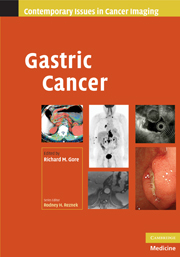Book contents
- Frontmatter
- Contents
- List of contributors
- Series Foreword
- Preface to Gastric Cancer
- 1 Epidemiology of gastric cancer
- 2 Pathology of gastric cancer
- 3 Endoscopy in the diagnosis and treatment of gastric cancer
- 4 Upper gastrointestinal series in the diagnosis of gastric cancer
- 5 Surgical management of gastric cancer
- 6 Systemic therapy for gastric cancer
- 7 MDCT, EUS, PET/CT, and MRI in the management of patients with gastric neoplasms
- 8 Gastric cancer: current trends and future opportunities
- Index
- References
8 - Gastric cancer: current trends and future opportunities
Published online by Cambridge University Press: 31 March 2010
- Frontmatter
- Contents
- List of contributors
- Series Foreword
- Preface to Gastric Cancer
- 1 Epidemiology of gastric cancer
- 2 Pathology of gastric cancer
- 3 Endoscopy in the diagnosis and treatment of gastric cancer
- 4 Upper gastrointestinal series in the diagnosis of gastric cancer
- 5 Surgical management of gastric cancer
- 6 Systemic therapy for gastric cancer
- 7 MDCT, EUS, PET/CT, and MRI in the management of patients with gastric neoplasms
- 8 Gastric cancer: current trends and future opportunities
- Index
- References
Summary
Introduction
Napoleon Bonaparte's remarkable political and military career was ended by Wellington at Waterloo in 1815. He died at age 52 on St. Helena in 1821 due to gastric cancer. Napoleon had a childhood of poverty, a poor diet in his early career, and a strong family history of gastric cancer, all of which contributed to his demise. It is now apparent that Helicobacter pylori, acting in the context of host genetic susceptibility, is responsible for most cases of stomach cancer. Napoleon was most likely infected with H. pylori – an example of the bacterium being mightier than the sword. This interaction between bacterium and host offers a new paradigm for carcinogenesis in the gastrointestinal (GI) tract and provides clues to the prevention and screening of this lethal malignancy.
As information concerning the epidemiology and molecular genetics of gastric cancer improves, sophisticated strategies for early detection and prevention of this disease in high-risk areas of the world will be developed. Eventually, molecular techniques will help identify those people at highest risk for this disease, so that resource-intensive endoscopic screening programs can be directed to this population. It is possible that, with directed use, screening programs will be validated by gastric cancer mortality reduction.
In this chapter, new concepts and horizons concerning prevention, screening, diagnosis, and treatment of patients with gastric adenocarcinoma are presented.
- Type
- Chapter
- Information
- Gastric Cancer , pp. 195 - 212Publisher: Cambridge University PressPrint publication year: 2009

